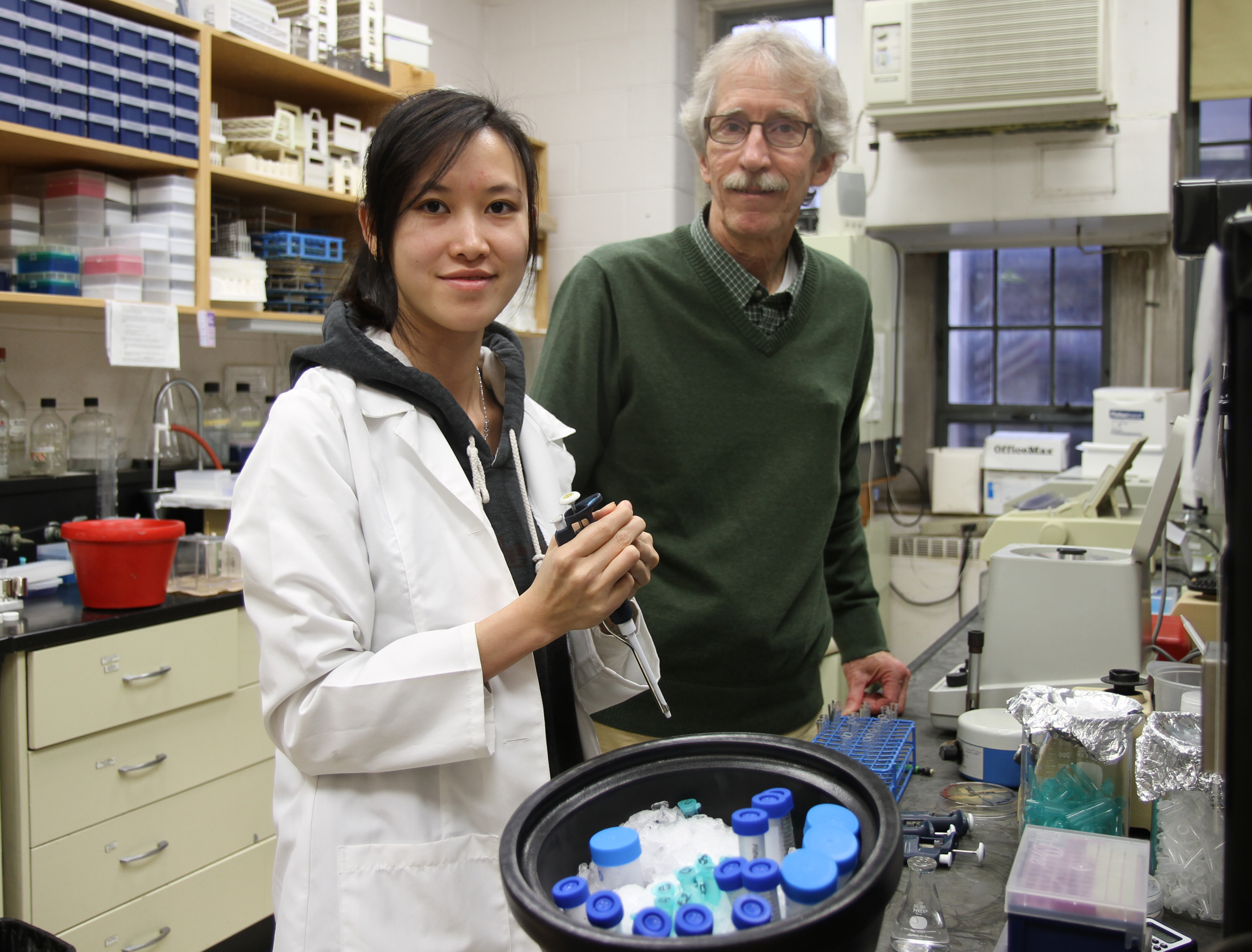Fralin Summer Undergraduate Research Fellowship students build lasting relationships with faculty

An undergraduate research experience looks good on any resume, whether a student is attempting graduate school or a scientific career. However, in the case of the Fralin Life Science Institute’s Summer Undergraduate Research Fellowship Program, what lies between the lines — a close, supportive relationship with a faculty mentor — is far more valuable.
Each year, students applying to the program -- commonly known as ‘SURF’-- are responsible for identifying a faculty member with similar research interests, and working with him or her to develop a project that could be completed during the full-time, 10-week summer program. The student application and the mentor letter of support are weighted similarly in the review process. This year, applications are due by 5 p.m. on Feb. 11.
Though all Virginia Tech undergraduates considering a career in life science-related research are encouraged to apply, preference is given to rising second and third year undergraduates, students with a cumulative grade point average of 3.0 or higher, and students who have yet to engage in a full-time summer research experience.
“The SURF program opened up so many doors for me, through our weekly meetings, professional development activities, and especially my experience working with Kaja Abbas,” said Jen Samuels of Virginia Beach, Va., a junior majoring in human nutrition, foods and exercise in the College of Agriculture and Life Sciences. “Before applying last year, I looked up different faculty members’ research interests and Dr. Abbas really stood out because of his work with computer modeling in the public health realm.”
Samuels, who plans to attend medical school after graduation, assisted Abbas in the summer of 2012 by using computer modeling software to simulate the effects of latent tuberculosis treatment in South Africa.
“We wanted to know what it would look like if the treatment there mirrored that in the U.S.,” she said. Samuels also attended a number of public health conferences, including the MIDAS Dynamics of Preparedness conference in Pittsburgh where she presented her poster, “Systems Modeling of Latent Tuberculosis and Drug Resistance for India and South Africa.”
“She is very independent and intrinsically motivated,” said Abbas, an assistant professor of population health sciences in the Virginia-Maryland Regional College of Veterinary Medicine. “The SURF program is a good threshold for allowing the students truly interested in research to rise to the top.”
Tim Larson, professor of biochemistry in the College of Agriculture and Life Sciences, was also pleased with the work of SURF 2012 student Diep Nguyen of Da Lat, Lam Dong, Vietnam, a senior majoring in biochemistry in the College of Agriculture and Life Sciences.
Nguyen assisted Larson in characterizing the enzyme system that, when absent, leads to sulfide build-up in humans, and ultimately, abnormal brain function. The team examined the enzyme interactions in a model bacterial system analogous to the one found in humans, using enzyme purification techniques to isolate the enzymes and determine which are involved in the process. They also used recombinant DNA techniques to obtain related genes.
After meeting Nguyen when she visited campus as a potential transfer student in the spring of 2011, Larson invited her to work in his lab, and to apply for a SURF fellowship the next summer.
“She enjoys talking science, she gets it,” said Larson. “It’s like talking to a graduate student when you talk to her. It’s fun to bounce ideas off each other.”
Nguyen will present a poster describing her work at the annual meeting of the American Society for Biochemistry and Molecular Biology in Boston in April 2013. While she originally planned to attend medical school after graduation, her SURF experience led her to pursue Ph.D. programs in biochemistry instead.
“Everything changed after my experience working as a full time undergraduate researcher with the SURF 2012 program,” Nguyen said. “The weekly meeting and professional development activities were helpful in providing and assisting students with their goals after graduation. I definitely could not have decided what I truly want to do after graduation without that experience.”
SURF 2012 student Ben Fox of Fairfax, Va., who is majoring in biological systems engineering in the College of Engineering, worked with Tom Inzana, the Tyler J. and Frances F. Young Professor of Bacteriology, and Abey Bandara, a research assistant professor of biomedical sciences and pathobiology who works with Inzana, both in the Virginia-Maryland Regional College of Veterinary Medicine.
Interested in biosensor work, Fox was the perfect fit for Inzana’s research team, which uses biosensor technology to detect bacteria in clinical samples. As part of his summer project and now continuing into the school year, Fox uses DNA probes coupled to nanoparticle-coated optical fibers to detect matching DNA of the bovine pathogen Histophilus somni. The goal is to develop a rapid diagnostic test to identify the presence of H. somni in clinical specimens. The same technology is being applied to detect methicillin-resistant Staphylococcus aureus and Brucella in clinical specimens.
Fox says he plans to pursue a Ph.D. in biomedical engineering.
“What stood out most to me about Ben was his dedication to the project,” Inzana said. “He was not required to continue working on it after the summer, but he did so without receiving credit or pay. He is also obviously talented because the probes and biosensor worked very well to detect the specific DNA without the need for prior DNA amplification. He accomplished the work within the time span allotted, and many students cannot do this.”
“It was very enriching to be given the ability to make mistakes and the tools to get the data myself,” Fox said. “I’m now far more sure of myself in a lab environment."




